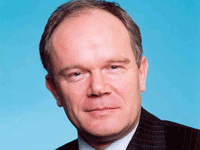
Social work has nothing to fear from the Health Professions Council, the body’s chief executive has insisted, as it takes over responsibility for regulating the profession.
In an exclusive interview, Marc Seale promised to listen to views from the sector and adapt the HPC’s conduct and registration systems to benefit social workers.
Seale was speaking to Community Care days after the Department of Health announced that the General Social Care Council would be scrapped and its functions, including the registration of 80,000 social workers in England, transferred to the HPC by 2012.
Sector leaders were left shocked by the decision, made without consultation and announced just four months after the previous Labour government recommended the creation of a “General Social Work Council”.
But Seale attempted to reassure practitioners by saying: “By bringing social work in line with the regulation we’ve got here, the professional profile will be raised. It’s absolutely not going to hinder it.”
Responding to fears raised on CareSpace – Community Care’s online forum – that social work would become dominated by healthcare models of regulation, Seale said he would not attempt to “shoehorn” social workers into the HPC.
“I think we’ll find things in the world of social work where we’ll actually be able to improve what we do for the existing professions,” Seale said. “But also where things work for those professions, we can bring that to social work.”
In a wide-ranging interview, he explained the integrated approach to regulation would also help universities, but raised doubts whether social work students would continue to be registered with the HPC, as they are under the GSCC.
Seale was confident, for example, that the HPC could offer social workers a better, less “punitive” conduct system by applying the fitness to practise model it currently uses for the professions it regulates.
Seale said this system, which includes the power to impose conditions for practice on professionals, would be applied to social work as soon as the GSCC’s functions were transferred to the HPC.
“At the end of the day, a professional might be able to redeem themselves and potentially come back onto the register,” he said. “We have to balance protecting the public with the human rights of the registrant: it’s not a punishment process.”
This mirrors the conduct system recommended by the Social Work Task Force and the Council for Healthcare Regulatory Excellence in separate reports. The GSCC had hoped to introduce a similar system.
Seale was not convinced that social work students needed to remain on the register, however, and said higher education institutions could monitor their behaviour on their own. The GSCC has argued that they should be, because students can be placed in frontline teams within weeks of beginning a course.
But Seale explained: “We say to universities: ‘If you’re running a programme, you have to make sure the students are behaving on the course and on practice placements’. If they don’t do that we can withdraw approval from the programme.”
While doctors and nurses are regulated by the General Medical Council and the Nursing and Midwifery Council respectively, the HPC, established in 2002, regulates 15 other healthcare professions such as paramedics, physiotherapists and chiropodists.
Seale said the profile of those fields had been raised by their involvement with the HPC, and pledged to do the same for social work.
While much of the detail will be worked out over the coming months before the transfer of functions begins this summer, Seale said there would be opportunities for social workers to have their say as part of the HPC’s ongoing cycle of updating and improving its standards.
“As a regulator, if we set our standards or processes without asking people first, we’re doomed.”
HPC: Key messages
● The HPC will adapt to social work, not the other way round.
● It can offer social work regulation independence from government at and lower fees than GSCC.
● Under its licence to practise system, the HPC will be able to impose conditions on social workers who are found guilty of professional misconduct.
● The HPC does not register students, relying instead on higher education institutions to monitor their behaviour.
● The wider social care workforce will not be a priority for registration.
Related articles
What GSCC abolition could mean for social workers
GSCC case backlog cleared but conduct reforms now in limbo
Call to appoint social workers to Health Professions Council


 Bournemouth, Christchurch and Poole
Bournemouth, Christchurch and Poole  Hampshire County Council
Hampshire County Council  Lincolnshire County Council
Lincolnshire County Council  Norfolk County Council
Norfolk County Council  Northamptonshire Children’s Trust
Northamptonshire Children’s Trust  South Gloucestershire Council
South Gloucestershire Council  Wiltshire Council
Wiltshire Council  Wokingham Borough Council
Wokingham Borough Council  Children and young people with SEND are ‘valued and prioritised’ in Wiltshire, find inspectors
Children and young people with SEND are ‘valued and prioritised’ in Wiltshire, find inspectors  How specialist refugee teams benefit young people and social workers
How specialist refugee teams benefit young people and social workers  Podcast: returning to social work after becoming a first-time parent
Podcast: returning to social work after becoming a first-time parent  Podcast: would you work for an inadequate-rated service?
Podcast: would you work for an inadequate-rated service?  Family help: one local authority’s experience of the model
Family help: one local authority’s experience of the model  Workforce Insights – showcasing a selection of the sector’s top recruiters
Workforce Insights – showcasing a selection of the sector’s top recruiters 

 Facebook
Facebook X
X LinkedIn
LinkedIn Instagram
Instagram
Comments are closed.